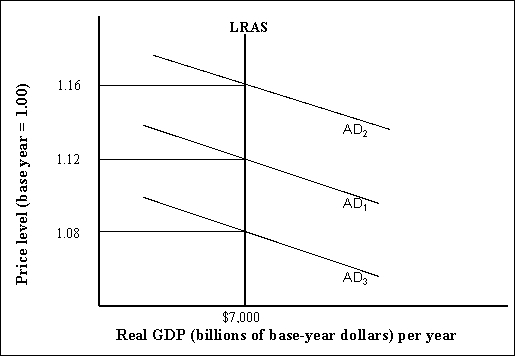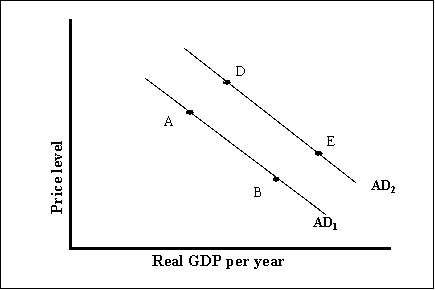Exam 22: Aggregate Demand and Aggregate Supply
Exam 1: Economics: the Study of Choice138 Questions
Exam 2: Confronting Scarcity: Choices in Production193 Questions
Exam 3: Demand and Supply243 Questions
Exam 4: Applications of Demand and Supply108 Questions
Exam 5: Macroeconomics: the Big Picture243 Questions
Exam 6: Measuring Total Output and Income228 Questions
Exam 7: Aggregate Demand and Aggregate Supply223 Questions
Exam 8: Economic Growth221 Questions
Exam 9: The Nature and Creation of Money267 Questions
Exam 10: Monopoly229 Questions
Exam 11: The World of Imperfect Competition227 Questions
Exam 12: Wages and Employment in Perfect Competition173 Questions
Exam 13: Interest Rates and the Markets for Capital and Natural Resources161 Questions
Exam 14: Imperfectly Competitive Markets for Factors of Production178 Questions
Exam 15: Public Finance and Public Choice179 Questions
Exam 16: Inflation and Unemployment132 Questions
Exam 17: International Trade179 Questions
Exam 18: The Economics of the Environment144 Questions
Exam 19: Inequality, Poverty, and Discrimination134 Questions
Exam 20: Macroeconomics: the Big Picture104 Questions
Exam 21: Measuring Total Income and Output134 Questions
Exam 22: Aggregate Demand and Aggregate Supply120 Questions
Exam 23: Economic Growth124 Questions
Exam 24: The Nature and Creation of Money183 Questions
Exam 25: Financial Markets and the Economy158 Questions
Exam 26: Monetary Policy and the Fed175 Questions
Exam 27: Government and Fiscal Policy177 Questions
Exam 28: Consumption and the Aggregate Expenditures Model199 Questions
Exam 29: Investment and Economic Activity115 Questions
Exam 30: Net Exports and International Finance202 Questions
Exam 31: Macro Inflation and Unemployment135 Questions
Exam 32: Macro a Brief History of Macroeconomic Thought and Policy120 Questions
Exam 33: Economic Development107 Questions
Exam 34: Socialist Economies in Transition129 Questions
Select questions type
Suppose an economy's exports increase and its imports decrease.All other things unchanged, this results in
Free
(Multiple Choice)
4.8/5  (27)
(27)
Correct Answer:
B
The interest rate effect suggests that the negative slope of the aggregate demand curve results in part because changes in the price level affect
Free
(Multiple Choice)
4.8/5  (44)
(44)
Correct Answer:
B
During the recession of 2001, despite the decrease in aggregate demand, the price level was essentially stable.Which of the following is a reason for this?
Free
(Multiple Choice)
4.7/5  (26)
(26)
Correct Answer:
B
Figure 7-2
 -Refer to Figure 7-2.Changes in aggregate demand from AD1 to either AD2 or AD3
-Refer to Figure 7-2.Changes in aggregate demand from AD1 to either AD2 or AD3
(Multiple Choice)
4.9/5  (35)
(35)
During the recession of 2001, the leftward shifts in aggregate demand and aggregate supply that occurred at that time necessarily reduced
(Multiple Choice)
5.0/5  (37)
(37)
The use central bank policies to influence the level of economic activity is called
(Multiple Choice)
4.8/5  (35)
(35)
Figure 7-2
 -Refer to Figure 7-2.If the real GDP is $7,000 billion and the implicit price deflator is 1.12, what is the value of nominal GDP?
-Refer to Figure 7-2.If the real GDP is $7,000 billion and the implicit price deflator is 1.12, what is the value of nominal GDP?
(Multiple Choice)
4.7/5  (32)
(32)
Figure 7-1
 -Refer to Figure 7-1.What could have caused a movement from point C to point A?
-Refer to Figure 7-1.What could have caused a movement from point C to point A?
(Multiple Choice)
4.9/5  (31)
(31)
In a graph that shows the aggregate supply and aggregate demand curves, what are the variables on the axes of the graph?
(Multiple Choice)
4.9/5  (28)
(28)
An increase in the prices of natural resources will lead to a decrease in short-run aggregate supply.
(True/False)
4.8/5  (31)
(31)
Figure 7-2
 -Refer to Figure 7-2.Based on the figure, we can conclude that
-Refer to Figure 7-2.Based on the figure, we can conclude that
(Multiple Choice)
4.8/5  (38)
(38)
Long-run aggregate supply corresponds to the level of potential output.
(True/False)
4.9/5  (42)
(42)
The potential level of real GDP is the level of output a society can achieve when labor is employed at its natural level.
(True/False)
4.8/5  (30)
(30)
The rise and fall of real GDP over the course of the business cycle suggests that
(Multiple Choice)
4.8/5  (38)
(38)
According to the wealth effect, if the average price level rises, the value of consumers'
(Multiple Choice)
4.8/5  (30)
(30)
A change in the price level, all other things unchanged, causes
(Multiple Choice)
4.9/5  (31)
(31)
Showing 1 - 20 of 120
Filters
- Essay(0)
- Multiple Choice(0)
- Short Answer(0)
- True False(0)
- Matching(0)